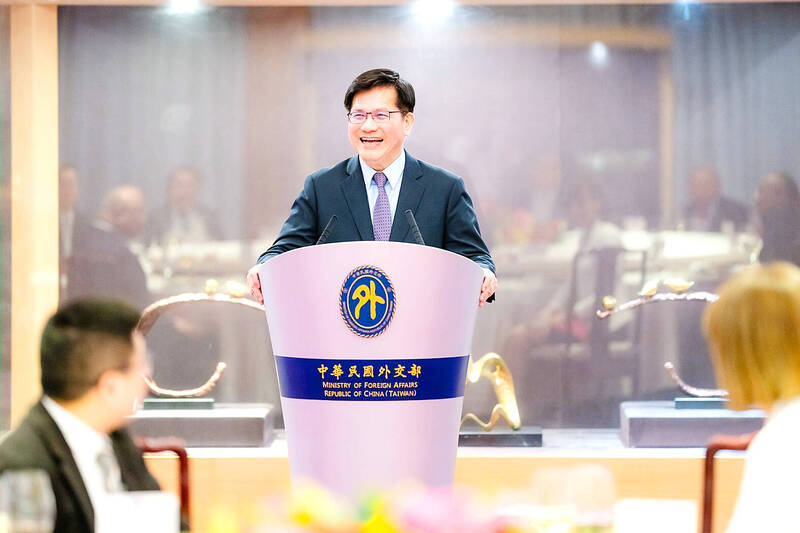《TAIPEI TIMES》New task force to forge economic ties unveiled

Minister of Foreign Affairs Lin Chia-lung speaks at a banquet in Taipei on Tuesday last week for the nation’s ambassadors-at-large. Photo courtesy of the Ministry of Foreign Affairs The government has created a task force to forge economic
PARTNERSHIPS:The group is to deepen ties with Taiwan’s diplomatic allies and other countries with shared values, and align with Lai’s ‘National Project of Hope’ policies
By Huang Ching-hsuan and Jonathan Chin / Staff reporter, with staff writer
The government has created a task force to forge economic partnerships with other nations based on shared interests and values, Minister of Foreign Affairs Lin Chia-lung (林佳龍) said in an interview with the Liberty Times (sister paper of the Taipei Times) yesterday.
Lin and Executive Yuan Secretary-General Kung Ming-hsin (龔明鑫) are the executive secretaries of the multi-ministerial task force under Premier Cho Jung-tai (卓榮泰) as convener, the minister said.
The group’s mandate is to foster economic development with diplomatic allies, forge new ties with friendly governments and align Taiwan’s international outreach with key policies in President William Lai’s (賴清德) “National Project of Hope,” he said.
The policies include resilient supply chains in the semiconductor industry, trustworthy Internet, offshore demonstration zones for industry parks, smart medical care, smart agriculture, green energy and sovereign artificial intelligence, Lin said.
The Executive Yuan task force often corresponds with the US Department of State’s Economic Diplomacy Action Group about economic diplomacy, clean Internet and expanding national power through partnerships of shared interests and values, he said.
The organization is tasked with deepening economic ties with the nation’s 12 diplomatic allies, as well as Asian and European states geopolitically aligned with Taipei to bolster Taiwan’s economy and diplomacy, Lin said.
Asked about the Japanese general election later this month and next month’s US presidential election, Lin said the change in governments is a normal democratic process and typically does not affect diplomacy, especially matters concerning Taiwan and China.
China’s hegemonic rise amid a tide of authoritarian expansionism has clarified the threat Beijing poses to other governments; it is an issue beyond the particulars of their leaders, he said.
Japanese Prime Minister Shigeru Ishiba largely inherits his predecessor Fumio Kishida’s geopolitics, following Tokyo’s affirmation of Taipei’s inclusion in the bounds of the US-Japan Security Treaty, Lin said.
Taiwan has little to fear in its relationship with the US, as Washington’s commitment to the nation’s security is based on the rock-solid foundation of the Taiwan Relations Act and the “six assurances,” he said.
The US continues to construct a multilateral security framework to support the first island chain in line with its legal obligations, Lin said, citing the AUKUS security partnership and the Quadrilateral Security Dialogue.
China’s attempt at challenging the rules-based international order, which threatens to engulf the Indo-Pacific under its fold, has also created friends and allies with shared values and security concerns for Taiwan, he said.
The Ministry of Foreign Affairs’ diplomatic efforts are aimed at bolstering the economy of Taiwan’s friends and broadening the support for its cause, Lin said.
In addition, the Ministry of Foreign Affairs and the Ministry of Environment established a joint work group to achieve net zero carbon emissions by 2050, he said.
Taiwan is not a UN member or signatory to the UN Framework Convention on Climate Change, making it necessary for the nation to obtain carbon credits via cooperation with diplomatic allies, Lin said.
The group is involved in ongoing projects in Guatemala, Paraguay, Palau and the Marshall Islands to write regulations governing carbon credits and their trade, with each ministry working on tasks falling within its domain, he said.
The net zero group is seeking private sector partners and expert opinions from academics to design a carbon offset trading system for Taiwan to use and export, Lin said.
新聞來源:TAIPEI TIMES












